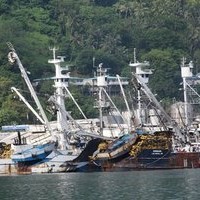
The owners of American Samoa’s second cannery, Samoa Tuna Processors, say the Treaty which allows US fishing boats to fish in waters of Pacific island countries is obsolete and needs to be revised.
Tri Marine International says in a statement that the tuna treaty in its current form fails to retain the most value for the resource owners because the Vessel Day Scheme places value on fishing days alone, rather than the tuna itself.
According to Tri Marine, calculating value based on fishing days is a shortsighted economic equation that doesn’t necessarily represent the long-term best interests of island communities.
At present some of the US purse seiners that were fishing in Pacific waters under the Treaty have stopped fishing because they dont have licenses.
US vessel owners informed the agency which approves the permits, the Forum Fisheries Agency that they cannot meet the payment which was agreed to for 2016.
The US vessels, represented by the American Tunaboat Association, are seeking a return of fishing days already approved by the Pacific Island countries, a move which is being met with opposition from the PICs who say the US should stick to the agreement.
Tri Marine says its position is community-based and therefore unique and certainly different from several other U.S.-flagged vessels.
The company says its focused in good faith on helping to fix a broken system involving 17 different Pacific island parties with the objective of providing long-term benefits to the region, while protecting the sustainability of the resource.
Tri Marine says it maintains American Samoa where 80% of the tuna industry is responsible for the economy as its home port and near to where the fish have historically been harvested.
The cannery says, “Over time, the U.S. fleet began competing with foreign interests in fishing vessels and transshipping in other areas became more prevalent.
“Through it all, Tri Marine has always focused on retaining the most value from the tuna resource in the community.”




